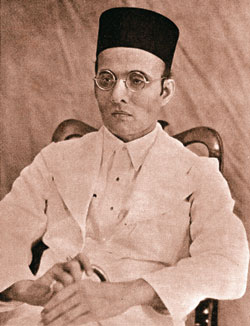
V.D. Savarkar
It is an election season and we shouldn’t be too surprised at the many personal and ideological transformations taking place across the spectrum of Indian politics. A parallel attempt is also underway in rehabilitating the images of divisive figures in the nation’s history like V.D. Savarkar—a man well-known for his anti-Muslim rhetoric through his numerous writings. The unveiling of his portrait in the parliament, in 2003, caused a minor controversy after the Congress and the Left expressed their discomfiture at the last moment. Ten years later another sensation has been created, but there was no controversy as the media and the scholarly & literary community lapped up claims that Savarkar’s Urdu ghazals have been discovered.
In August of this year, his fans and the media went on an overdrive arguing that he wasn’t a bigot he is made out to be, and that he was a ‘great believer’ in Hindu-Muslim unity. A recently discovered scrap-book containing Urdu poetry was cited as evidence of his secular credentials. A closer examination reveals that the story has many holes.
The scrapbook, identified as a ‘notebook’ by the media, was apparently found in the library of the late S.P.Gokhale, an associate of Savarkar. It has eight pages of Urdu poetry written in Urdu and the Devanagari script. Ranajit Savarkar, grandson of Savarkar, claims that it was written in the last few months of his incarceration in 1921 when he was able to get access to paper and ink.
The claim that this poetry is Savarkar’s is spurious on several grounds. First of all there is no evidence that this scrapbook actually belongs to Savarkar. His name is not written anywhere in the book. It has the name Pyaray Mohan written on one page. Another page is a history sheet of a prisoner sentenced for dacoity in Moradabad. It contains cuttings of imagined illustrations and pictures of Lord Rama, Jesus Christ, Gandhi Ji, Swami Vivekanand, Tilak, George Washington among others, with some notes written by their collector.
Secondly, there is no evidence that Savarkar ever mastered enough Urdu to compose his own poetry. He didn’t learn Urdu in his schooling years. It is widely believed that he learnt it in either Europe or later in the Andamans. In his book, The War of Independence, he does quote Bahadur Shah Zafar’s poetry, demonstrating a grasp of the language but that doesn’t mean he was capable of composing original verses in Urdu.
Third, since his early activist career he had been a vocal advocate of replacement of Urdu with Hindi and other regional languages. This aggressive pro-Hindi activism began in 1906 when each member of Abhinav Bharat was asked to take an oath of making all efforts to make Hindi in the Devanagari script the national language of India. Similarly, we find frequent references of him asking his followers to purge Hindi of Urdu and Persian words.
Fourth, he set about dividing the prisoners on religious and linguistic lines as soon as he arrived in Andamans. As many as ninety percent of prisoners used Urdu for their correspondence with relatives and jail authorities prior to Savarkar’s arrival. Savarkar urged them to discard the use of Urdu and instead use Hindi or other regional language.
But the clinching evidence that disproves the theory that Savarkar is the author of the poetry is the existence of a ghazal in a poetry collection published by the Indian revolutionaries of the Ghadar Party,in 1914, from the Yugantar Ashram in San Francisco. The poem ‘Yehi paogey mehshar mein zubaan meri bayan mera…’ is found in the nagari script in the script on page 31 of the book Ghadar Di Goonj. This collection consisting of poems written by ordinary Ghadar revolutionaries doesn’t carry the poets’ names. It contains mostly Punjabi poetry with a few Urdu poems—all written in the Urdu script. They originally became popular by word of mouth before being compiled. They are patriotic and secular in nature without the slightest hint of bigotry that exemplifies Savarkar’s writings.
It is very possible that Savarkar had might come into contact with the hundreds of Ghadarites who were imprisoned at the Andamans. Their revolutionary fervour and patriotism was infectious and Savarkar also wouldn’t have remained untouched. In one of those moments he might well have jotted down what he heard from others.
To claim that Savarkar was a lover of Urdu or that he was free of bigotry on such thin evidence is spurious to say the least. His followers and fans need to come up with stronger proof in order to establish his supposed secular credentials.
Lastly, such attempts are an insult to the memory of the Ghadarite revolutionaries whose centenary communities across North America are commemorating this year. They had dreamt of a free, secular, cohesive and united India. Savarkar’s divisive agenda was completely antithetical to their dreams.





